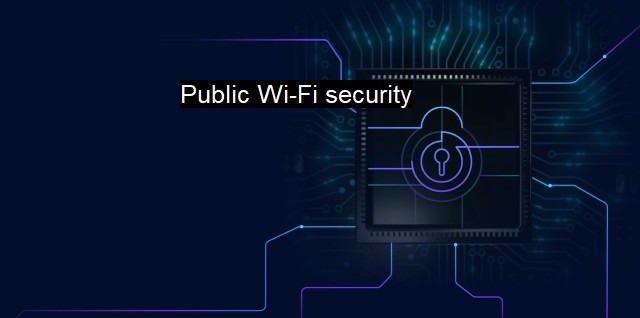What is Public Wi-Fi security?
Staying Safe in Public: The Essential Guide to Public Wi-Fi Security and Antivirus Software
Public Wi-Fi Security, with is an incredibly pertinent subject for contemporary society. As we further embrace digital living and the internet of things, reliance on public Wi-Fi networks is growing, making cybersecurity even more crucial. Unauthorized access and data theft are among some concerns when using public Wi-Fi, highlighting the importance of understanding public Wi-Fi security.Public Wi-Fi Security pertains to the measures taken to guard information sent over public wireless networks, limiting the chances of cyber intrusions or attacks. The digital world offers a vast array of Cyberspace utilities, such as online shopping, banking, and more, but accessing these applications over a non-secure public Wi-Fi connection can cause numerous cyber threats.
Security vulnerabilities in public Wi-Fi are due to several reasons. For one, public Wi-Fi is often unencrypted, enabling prying eyes to discretely steal data as it traverses the internet waves. Similarly, cybercriminals often position themselves in public locations to intercept and misuse data being communicated over public Wi-Fi. This type of cyber attack, known as Man-in-the-Middle (MitM), can result in severe privacy intrusion or, worse, identity theft.
Therefore, public Wi-Fi users must consider public Wi-Fi security mechanisms to prevent unsolicited access to your information. VPNs, or Virtual Private Networks, are a popular solution, creating a secure, encrypted online tunnel that extends beyond public access. By sending information through this private pathway, it ensures encryption from end-to-end, meaning only the sender and recipient can view it.
Public Wi-Fi security also entails responsible user behavior. This means avoiding the sharing of sensitive data when connected to public Wi-Fi and disabling automatic connection options in your devices to prevent unknowingly connecting to insecure networks. concentrating on authenticating to networks that use WPA3, which provides improved security protocols over its previous iterations, can also significantly boost Wi-Fi safety.
Particularly, cybersecurity software and antivirus programs play a significant role in public Wi-Fi security. These defend against viruses, malware, and other harmful online elements, alerting users of any alarming activity and often providing secure browsing features. Many modern antivirus applications possess robust attributes like VPNs, password managers, or real-time protection to secure data and improve browsing safety.
Employing anti-malware capabilities will prevent the infiltration of undesirable software into your devices. Advanced malware can deploy keyloggers that track your keystrokes, exposing passwords and other sensitive information to hackers, even when browsing over secure connections. Thus, integrating productive antivirus software that provides efficient malware scanning and eradication is crucial.
Firewalls also play a critical role in public Wi-Fi security. Strategic placement of firewalls within a user's computer offers additional safety barriers and protection against online threats when using a public Wi-Fi. They provide intrusion prevention measures by managing and controlling the inbound and outbound network traffic based on predetermined security rules.
Efficiently managing security settings is also essential for assuring public Wi-Fi security. enabling 'https secure browsing' can guarantee your data remains encrypted as they move through the internet channels. Also, managing the security settings on your social media platforms can ensure personal details don't fall prematurely into unscrupulous hands.
Public Wi-Fi security, set in the frame of cybersecurity and antivirus, is critical as the reliance on public Wi-Fi networks is expected to rise. By embracing robust security measures such as VPNs, smart user habits, advanced antivirus protections, you place yourself in a stronger position against online threats. Yet, it is crucial to remain vigilant in the digital age, as cybercriminals continuously adapt and find creative new ways to exploit the system.

Public Wi-Fi security FAQs
What is public Wi-Fi security?
Public Wi-Fi security refers to the measures taken to protect personal and confidential information while using public Wi-Fi networks, which are often unsecured and can be vulnerable to cyber-attacks. It involves using encryption, antivirus software, and other security measures to ensure the safety of your data and devices.Why is public Wi-Fi security important?
Public Wi-Fi networks are often unsecured or only use weak security protocols, making them easy targets for cybercriminals to intercept or manipulate data. By using strong security measures, you can help protect your personal and business information from being stolen or compromised.What are some tips for staying safe on public Wi-Fi networks?
To stay safe on public Wi-Fi networks, always use a virtual private network (VPN) to create a secure, encrypted connection, avoid accessing sensitive information like bank accounts or company data, use antivirus software to detect and block malware, and be cautious when clicking links or downloading attachments.What are the risks of using public Wi-Fi without proper security measures?
Using public Wi-Fi networks without proper security measures can leave you vulnerable to a variety of cyber threats, including identity theft, malware infections, and data breaches. Hackers can intercept your data, steal your passwords, and even take control of your device. In some cases, they can use this access to launch attacks against your employer or other sensitive systems.| | A | | | B | | | C | | | D | | | E | | | F | | | G | | | H | | | I | | | J | | | K | | | L | | | M | |
| | N | | | O | | | P | | | Q | | | R | | | S | | | T | | | U | | | V | | | W | | | X | | | Y | | | Z | |
| | 1 | | | 2 | | | 3 | | | 4 | | | 7 | | | 8 | | |||||||